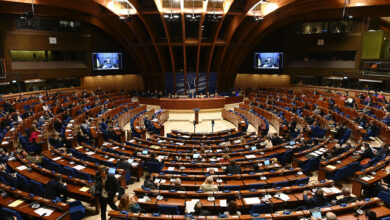Ending the state of emergency has long been a priority for pro-reform Egyptians and was one of the main demands of the 25 January revolution. But more than five months after the ouster of former President Hosni Mubarak, the Emergency Law is still in force, as it has been for the last 30 years, diminishing chances to reform the security apparatus, a fundamental demand of the revolutionaries.
The ruling Supreme Council of the Armed Forces (SCAF) promised to repeal the Emergency Law ahead of parliamentary elections, which are expected to take place in October or November. Yet while the Emergency Law has been less strictly enforced than it was before Mubarak stepped down in February, its continued existence contradicts the SCAF’s constitutional declaration that was confirmed by a popular referendum in March.
The prosecution of 84 people accused of igniting sectarian clashes in the Cairo neighborhood of Imbaba in early May was the first case to be transferred to a State Security Court – which is provided for by the Emergency Law – since the revolution began.
The wording of the Emergency Law does not clarify which crimes fall under its jurisdiction. Yet, despite this ambiguity, Prime Minister Essam Sharaf announced that the Imbaba case should be tried under the Emergency Law.
“[The Imbaba case] is complicated, with many different parties involved,” he said, adding that the emergency courts are familiar with this kind of case.
The Emergency Law places restrictions on citizens’ freedom to assemble, and meet or stay at certain times in certain places, as well as gives police the power to arbitrarily detain or search anyone suspected of jeopardizing security and public order; in none of these powers are police required to abide by regular criminal law procedures.
The law also grants the president, or whoever is filling the executive position (in this case the SCAF), extensive powers. In a state of emergency, the president has the right to transfer any case to a State Security Court and select its judges. While the defendant can’t appeal the verdict, the president is given jurisdiction to order a retrial, or to relax, change or cancel the sentence. Furthermore, the president must approve all sentences.
Mahmoud al-Khodeiry, former vice president of the Court of Cassation and a leading voice in the movement for judicial reform, calls the continuing use of the Emergency Law unnecessary and the reason behind the persistence of police violations.
“Police used to act with impunity during Mubarak’s rule, which was the reason why the revolution erupted in the first place,” Khodeiry told Al-Masry Al-Youm. “Lifting the state of emergency is a must in order to put legal limits on police actions.”
Egypt has been under a state of emergency for 54 out of the last 59 years; it was lifted for five scattered years during that period. The current state of emergency has been active since the assassination of President Anwar al-Sadat in 1981.
Mubarak and his government used the Emergency Law mainly to cripple political opposition and the press, and to oppress Islamists, who suffered years of abuse and torture in detention centers at the hands of the infamous State Security Investigation Services (SSIS). The SSIS apparatus was dissolved in March and replaced by the National Security Agency, which, according to statements made by the interior minister, will now be responsible only for investigating terrorism.
Although the Imbaba case has been the only technical use of the law since Mubarak’s ouster, the state of emergency continues to confer legitimacy on the military trials of civilians, which have sent thousands of people to military prisons. These martial detentions have prompted severe criticism from both local and international human rights groups, who complain that defendants are not allowed to see lawyers or even to let lawyers and relatives know where they are.
Ahmed Seif al-Islam, a human rights lawyer and founder of the Hisham Mubarak Law Centre, says that some provisions of the Emergency Law contradict the constitutional declaration introduced by the military in March. Courts, he says, are not bound to follow constitutional principles, noting that Egypt has already gone through eight different constitutions in its history.
“Courts base their rulings on the law, because they are bound by the rule of law and not the constitution; that’s why a state security court would abide by the Emergency Law and not the constitution,” said Islam.
Islam added that the Emergency Law contradicts Articles 8 and 13 of the SCAF’s constitutional declaration. Article 8 preserves the personal freedom of citizens so that, unless one is committing a crime, he or she may not be arrested, searched, detained or have his or her freedom restricted in any way. Likewise, no one can be restricted from freedom of movement, unless he or she is part of an ordered investigation, endangering public security, or subject to a warrant issued by a judge or public prosecutor.
Article 3 of the Emergency Law, on the other hand, puts no limits on these actions, giving the president the freedom to arrest, search, wire tap and restrict the movement of any person suspected of posing a danger to public order or security.
Article 13 of the constitutional declaration preserves the freedom of the press and prohibits any censorship except in a state of emergency.
Islam also agrees with Khodeiry that lack of change to the Emergency Law is a slap in the face of the revolution.
“Generations and generations of police officers were raised under the Emergency Law. They don’t know how to enforce the law normally, so the Ministry of Interior will not be reformed without removing the state of emergency,” said Islam.
Islam added that the Emergency Law also obstructs the existence of an independent judiciary, as it gives the president the right to choose the judges who rule in state security cases, allowing for corrupt decisions.
He believes that there is no legal guarantee that the SCAF will actually end the state of emergency, saying that all people can do is exert pressure on the SCAF, as their statements have been mostly “vague”.
“The current state of emergency has existed since being extended by the now-dissolved parliament. We are living out the result of a previous decision,” said Islam.
“Although the SCAF is currently the only entity that can make a decision regarding the Emergency Law, it does not have to lift it until a new parliament is appointed. It’s possible that they will suspend the state of emergency only during the elections and reactivate it again afterward.”
Unlike the 1971 constitution under Mubarak that gave the president wide powers in a state of emergency, the constitutional declaration approved in a referendum in mid-March provided new conditions and limits. According to Article 59 of the constitutional declaration, in order for the president to announce a state of emergency, he has to consult with the cabinet and obtain approval from a majority of members of parliament. The declaration also establishes a six-month limit beyond which any extension cannot take place unless a majority of people vote for it in a nationwide referendum.
Islam explained that the constitutional declaration could culminate in two potential results: either the new conditions will pertain to future emergencies, or the newly elected parliament will overturn the former parliament’s decision, especially regarding the stipulation that ending the Emergency Law is conditional on the drafting of a new anti-terrorism law.
The now-dissolved parliament had announced in 2010 that it would extend the state of emergency for two years, until an anti-terrorism law was drafted to replace the Emergency Law. Even then, before the revolution, the decision fueled angry opposition and ignited protests.
Both Khodeiry and Islam, however, conceded that the Emergency Law has not been used as abusively as it was under Mubarak, when extensive detentions and media intimidation were the norm.




